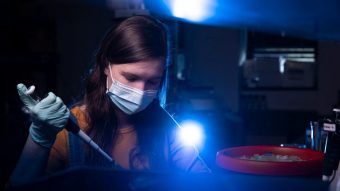
There are many ways for students to find their place at the University of Missouri. For some, it’s through clubs and extracurricular activities. For others, it’s through academic opportunities that can help them achieve their dreams.
Senior Stephanie Scott dreams of becoming a surgeon. A biochemistry and nutritional science major, Scott is preparing for medical school. She credits the opportunities she’s had at Mizzou — specifically as a research assistant in two different labs on campus, for helping her discover her path.
Scott’s journey started with the Discovery Fellows Program, a two-year scholarship that gives freshmen in the Honors College the ability to work in a research lab. Getting into a lab, she learned, was beneficial to her journey to med school, so she decided to apply.
“The worst thing people can say is no, and then you’re no worse off than when you started,” Scott said. “But if they say yes, then you’ve opened up a whole host of different doors.”
Scott was accepted into the program but said she walked into Jay Thelen’s lab at the Bond Life Sciences Center feeling underprepared and behind the curve. For one thing, her high school chemistry classes hadn’t taught her how to use a pipette.
“I really didn’t have a lot of confidence,” Scott said. “So I think working [there] really helped me develop myself as a scientist and decide that this was a field that I could actually be good at.”
As a sophomore, she took her acquired knowledge to Richard Ferrieri’s lab at the MU Research Reactor. There, she was given more responsibility and used the foundation of skills she developed in the previous lab to take charge of her own projects.
For two years, Scott experimented on corn plants and observed whether adding certain bacteria to the roots increased the iron and thus the nutritional value of the crop.
Scott’s team discovered the bacteria did, in fact, increase the iron content. Scott was the first author of the scholarly article that detailed their findings, published last year in the academic journal Agronomy. Scott said she felt honored knowing her research is “out there for people to read and learn from.”
On top of her lab work and courses, Scott has taken on a teaching role. She instructs a medical careers freshman interest group and helps biochemistry professor Thomas Reilly as his peer learning assistant. She finds both positions rewarding.
“Knowing that every time somebody does biochemistry now, a part of what they do is because of something you taught them, is so cool,” said Scott. “You make such a difference doing it.”
For students to become engaged, Scott recommends just talking to people. She became a peer learning assistant, for instance, simply by reaching out to her professor. It can be hard for first-year students, she says, but by taking a chance when she applied to the Discovery Fellows Program, she discovered her passion and came a step closer to her dream career.



